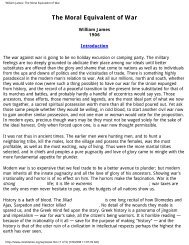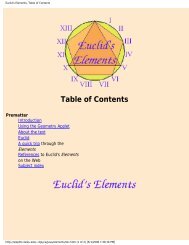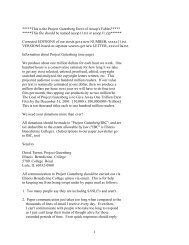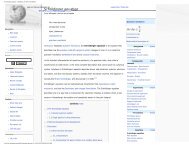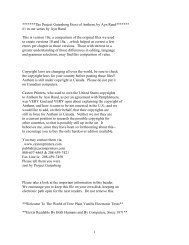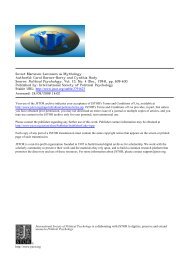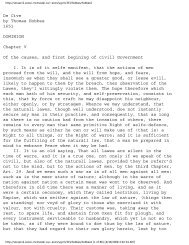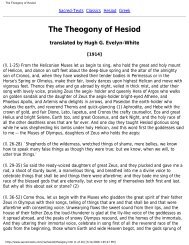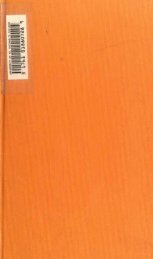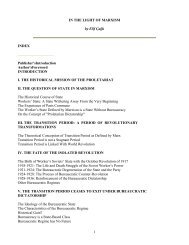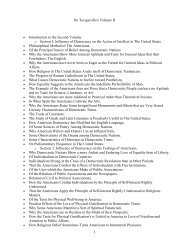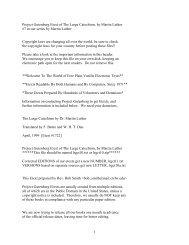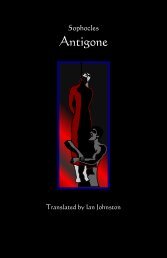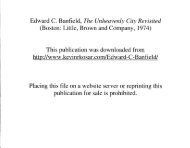Thomas Jefferson: A Manual of Parliamentary Practice
Thomas Jefferson: A Manual of Parliamentary Practice
Thomas Jefferson: A Manual of Parliamentary Practice
Create successful ePaper yourself
Turn your PDF publications into a flip-book with our unique Google optimized e-Paper software.
<strong>Thomas</strong> <strong>Jefferson</strong>: A <strong>Manual</strong> <strong>of</strong> <strong>Parliamentary</strong> <strong>Practice</strong><br />
seconded. Scob. 21.<br />
The Senate say no motion shall be debated until the same shall be seconded. Rule 6.<br />
It is then and not till then in possession <strong>of</strong> the House, and cannot be withdrawn but by leave<br />
<strong>of</strong> the House. It is to be put into writing, if the House or Speaker require it, and must be read<br />
to the House by the Speaker as <strong>of</strong>ten as any member desires it for his information. 2 Hats. 82.<br />
The rule <strong>of</strong> the Senate is, when a motion shall be made and seconded, it shall be<br />
reduced to writing, if desired by the President, or any member, delivered in at the<br />
table, and read by the President before the same shall be debated. Rule 7.<br />
It might be asked whether a motion for adjournment or for the orders <strong>of</strong> the day can be made<br />
by one member while another is speaking It cannot. When two members <strong>of</strong>fer to speak, he<br />
who rose first is to be heard, and it is a breach <strong>of</strong> order in another to interrupt him, unless by<br />
calling him to order, if he departs from it. And the question <strong>of</strong> order being decided, he is still<br />
to be heard through. A call for adjournment, or for the order <strong>of</strong> the day, or for the question,<br />
by gentlemen from their seats, is not a motion. No motion can be made without rising and<br />
addressing the chair. Such calls are themselves breaches <strong>of</strong> order, which though the member<br />
who has risen may respect, as an expression <strong>of</strong> the impatience <strong>of</strong> the House against further<br />
debate, yet, if he chuses, he has a right to go on.<br />
SEC. XXI.<br />
RESOLUTIONS.<br />
WHEN the House commands, it is by an "order." But facts, principles, their own opinions, and<br />
purposes, are expressed in the form <strong>of</strong> Resolutions.<br />
A Resolution, for an allowance <strong>of</strong> money to the clerks, being moved, it was<br />
objected to as not in order, and so ruled by the chair. But on an appeal to the<br />
Senate (i.e. a call for their sense by the President on account <strong>of</strong> doubt in his mind<br />
according to Rule 16.) the decision was overruled. Journ. Sen. June 1, 1796.I presume<br />
the doubt was, whether an allowance <strong>of</strong> money could be made otherwise than by<br />
bill.<br />
SEC. XXII.<br />
BILLS.<br />
EVERY bill shall receive three readings, previous to its being passed; and the<br />
President shall give notice at each whether it be the first, second, or third; which<br />
readings shall be on three different days, unless the Senate unanimously direct<br />
otherwise, or, unless by a joint vote <strong>of</strong> both Houses, or the expiration <strong>of</strong> their term,<br />
http://www.constitution.org/tj/tj-mpp.htm (26 <strong>of</strong> 70) [4/14/2008 6:37:46 PM]



